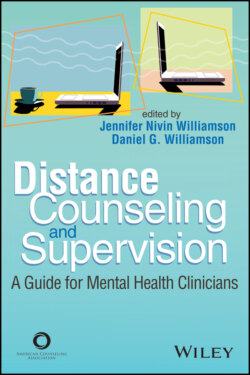Читать книгу Distance Counseling and Supervision - Группа авторов - Страница 6
Оглавление
PREFACE
This book has been an exploration that began in 2016 when we were in an American Counseling Association (ACA) Ethics Committee town hall meeting. The conversation was rich with questions about telehealth, and there were more questions than answers. In an effort to better understand the complexities of this topic, we invited the leaders and many stakeholders from governing and advising bodies to contribute to a panel discussion. At that time, we included the cochair of the ACA Ethics Committee, the cochair of the ACA Policies and ByLaws Committee, the chair of the Council for Accreditation of Counseling and Related Educational Programs, the president of the American Association of State Counseling Boards, the founder of Motivo, the founder of WeCounsel, counselor educator and marriage and family leaders, and experts in the use of avatar and virtual platforms in counselor education. This conversation was so rich that this book was born.
As we were editing the final chapters in February and March 2020, we began to experience something completely unexpected because of Coronavirus (COVID-19). Most communities in the United States and many communities across the globe were ordered to shelter in place. Counselors and other mental health workers were attempting to balance the necessity of limiting exposure to themselves and their clients while still maintaining services for clients in need during an incredibly stressful time. Even the most conservative and technology-cautious professionals were attempting to offer virtual services. For the first time in our memory, the Health Insurance Portability and Accountability Act of 1996 and other privacy laws were temporarily relaxed because of the emergency. Governors, federal offices, and licensure boards eased restrictions on definitions around residency and restrictions on the use of technology in counseling and supervision. Although the relaxation of these standards might have been temporary, it ushered in a new era of technology-based counseling and supervision. During this time, most counselors, counselor educators, and supervisors used various platforms to continue providing services for clients. Synchronous videoconferencing platforms such as Zoom, Doxy.me, and Webex became common venues for counseling and supervision. Clinical spaces were created in parked cars, spare bathrooms, or makeshift home offices. Professional organizations, including ACA and its state and regional affiliates, rose to the occasion and organized trainings via videoconferencing in an effort to help counselors across the globe prepare for the task before them. During an emergency, such as the COVID-19 pandemic, it is important for professionals to attend to licensing authorities’ websites for their state, their state’s governor’s office, the U.S. Department of Health and Human Services, state and local professional organizations, and national organizations (including ACA). ACA has a web presence dedicated to telebehavioral health in its Knowledge Center (https://www.counseling.org/knowledge-center/mental-health-resources/trauma-disaster/telehealth-information-and-counselors-in-health-care/telebehavioral-health-licensure-and-liability-insurance).
This book is a tool for continuing the conversation among our colleagues to encourage the use of technology in productive, safe, and confidential ways so that we may better serve our clients, supervisees, and the profession. Although this resource offers suggestions for professional practice, it is our hope that it will provide insights and valuable questions for greater exploration as you venture further into telebehavioral health services.
All author proceeds from this book will go to Uganda Counseling and Support Services (ugandacss.org) in support of their efforts to bring counseling, education, and medical care to underserved communities throughout Uganda.
